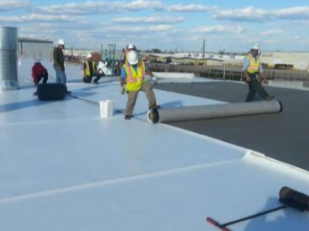At Alpha Commercial Roofing, we understand the importance of having a solid and reliable roof for commercial buildings. As a professional roofing company, we believe that knowledge empowers our clients to make informed decisions about their roofing needs. In this blog post, we aim to provide a guide to help you understand the different types of commercial roofing systems available in the market today.
Built-Up Roofing (BUR)
Built-Up Roofing (BUR) systems have been a popular choice for commercial buildings for many years. These systems consist of multiple layers of bitumen and reinforcing materials, creating a durable and weather-resistant roof. They provide excellent waterproofing and can withstand extreme weather conditions, making them suitable for various climates. BUR systems are also resistant to fire and have a high thermal mass, which helps in reducing energy consumption by providing insulation.
However, BUR systems do have some drawbacks. One of the main disadvantages is their weight. The multiple layers of materials used in BUR systems can make them quite heavy, which may require additional structural support for the building. The installation process is also labor-intensive and time-consuming, as each layer needs to be applied and properly sealed. Additionally, the use of hot asphalt or coal tar during installation can emit strong odors and require proper ventilation. BUR systems also require regular maintenance, such as periodic resealing and gravel replacement, to ensure their longevity. Overall, while BUR systems offer excellent durability and protection, their weight, installation complexity, and maintenance requirements should be carefully considered before choosing this roofing option.
Single-Ply Roofing Systems
Single-ply roofing systems, including EPDM, TPO, and PVC membranes, offer excellent versatility and ease of installation.TPO roofing membranes are made from a blend of polypropylene and ethylene-propylene rubber, offering excellent resistance to UV radiation and chemicals. PVC membranes are made from a synthetic polymer known as polyvinyl chloride, providing superior resistance to fire, chemicals, and punctures. EPDM roofing membranes are made from a synthetic rubber compound, offering excellent weathering resistance and flexibility. Single-ply roofing systems are lightweight, making them suitable for both new construction and roof retrofit projects. They are highly resistant to UV rays, weathering, and extreme temperatures, providing long-lasting performance. Single-ply roofs are also known for their excellent waterproofing capabilities, minimizing the risk of leaks and water damage. These systems offer energy efficiency, reflecting heat and reducing cooling costs. They are also resistant to mold and mildew growth.
Single-ply roofing systems also have some potential drawbacks. The installation of single-ply membranes can be sensitive to weather conditions, as they often require favorable temperatures for proper adhesion. Improper installation can lead to premature membrane failure. Some single-ply materials may be susceptible to punctures, especially during the installation or maintenance processes. Regular inspections and maintenance are essential to identify and repair any potential issues. Additionally, the cost of single-ply roofing systems can vary depending on the type of membrane chosen and the complexity of the project. Overall, the advantages of single-ply roofing systems, such as their durability, waterproofing properties, and energy efficiency, make them a popular choice for many commercial and industrial applications, but careful consideration should be given to the specific requirements and limitations of each type of single-ply membrane.
Modified Bitumen Roofing
Modified bitumen roofing systems are another popular choice for low-slope or flat roofs. They are made from asphalt that has been modified with polymers to enhance its durability and flexibility. Modified Bitumen roofs are installed in two or three layers, which are either torch-applied, cold-applied, or self-adhered. These systems provide excellent waterproofing and can withstand extreme weather conditions, including high winds and hail. They have a longer lifespan compared to traditional asphalt roofs, lasting around 20 to 30 years with proper maintenance. “Modbit” roofs also offer good UV resistance, which helps in reducing heat absorption and extending the life of the roof.
One of the main advantages of Modified Bitumen roofing systems is their ease of installation. They can be applied using various methods, allowing for flexibility and convenience during the installation process. Modified Bitumen roofs also provide excellent flexibility and are resistant to cracking and splitting, even in cold temperatures. They are less susceptible to thermal expansion and contraction, which helps in maintaining the integrity of the roof over time. However, like any roofing system, Modified Bitumen roofs have their drawbacks. They can be more expensive than traditional asphalt roofs, especially if multiple layers or special installation techniques are required. Additionally, they may require regular maintenance, including periodic resealing and the replacement of worn-out layers, to ensure their longevity.
Metal Roofing Systems
Metal roofing systems are popular due to their durability, energy efficiency, and aesthetic appeal. Typically made of steel, aluminum, or copper, metal roofs offer exceptional resistance against harsh weather conditions such as rain, wind, snow, and even fire. They are lightweight, which reduces the strain on the structure of the building and allows for easy installation. Metal roofs have a long lifespan, often lasting 40 to 70 years or more with proper maintenance. They are also energy-efficient, reflecting heat from the sun and reducing cooling costs during hot weather. Metal roofs come in a variety of styles and colors, offering aesthetic appeal and enhancing the overall appearance of the building.
Metal roofing systems do have a few drawbacks. One of the main concerns is the initial cost, as metal roofs tend to be more expensive than traditional roofing materials such as asphalt shingles. However, the long lifespan and low maintenance requirements of metal roofs can offset this initial investment over time. Another potential drawback is the potential for noise during heavy rainfall or hailstorms. While proper insulation and underlayment can help mitigate the noise, some business owners may still find it bothersome. Lastly, metal roofs can be susceptible to denting if hit by large hail or heavy objects. However, modern metal roofing materials are designed to be more resistant to denting, and regular inspections and repairs can help maintain the integrity of the roof.
Roof Coating Systems
Commercial silicone roof coating systems have gained popularity as a cost-effective and efficient way to protect and restore flat or low-slope commercial roofs. Roof coating systems can provide an extra layer of protection and extend the life of your commercial roof.
Silicone coatings are liquid-applied and form a seamless, durable, and flexible membrane over the existing roof substrate. On average, a well-applied and properly maintained silicone roof coating can last anywhere between 10 to 20 years. One of the main advantages of silicone roof coatings is their excellent waterproofing properties. Silicone coatings are also highly UV resistant and can withstand extreme temperature variations and weather conditions, including high winds and hail.
Silicone coatings have a relatively higher initial cost compared to some other roof coating options. However, the long-term benefits, including energy savings, reduced maintenance, and extended roof life, can make them a cost-effective choice in the long run. It's also important to note that silicone coatings are not compatible with all roof substrates, so compatibility testing or consultation with roofing experts is recommended.
Understanding the different types of commercial roofing systems is crucial for making informed decisions about your roofing needs. At Alpha Commercial Roofing, we are committed to equipping our clients with knowledge and expertise to ensure the longevity and reliability of their commercial roofs. We encourage you to consult with our professional roofing contractors who can assess your specific requirements and guide you in selecting the ideal roofing system for your commercial property. Remember, a well-informed decision today can lead to years of security and peace of mind for your investment in the future.





